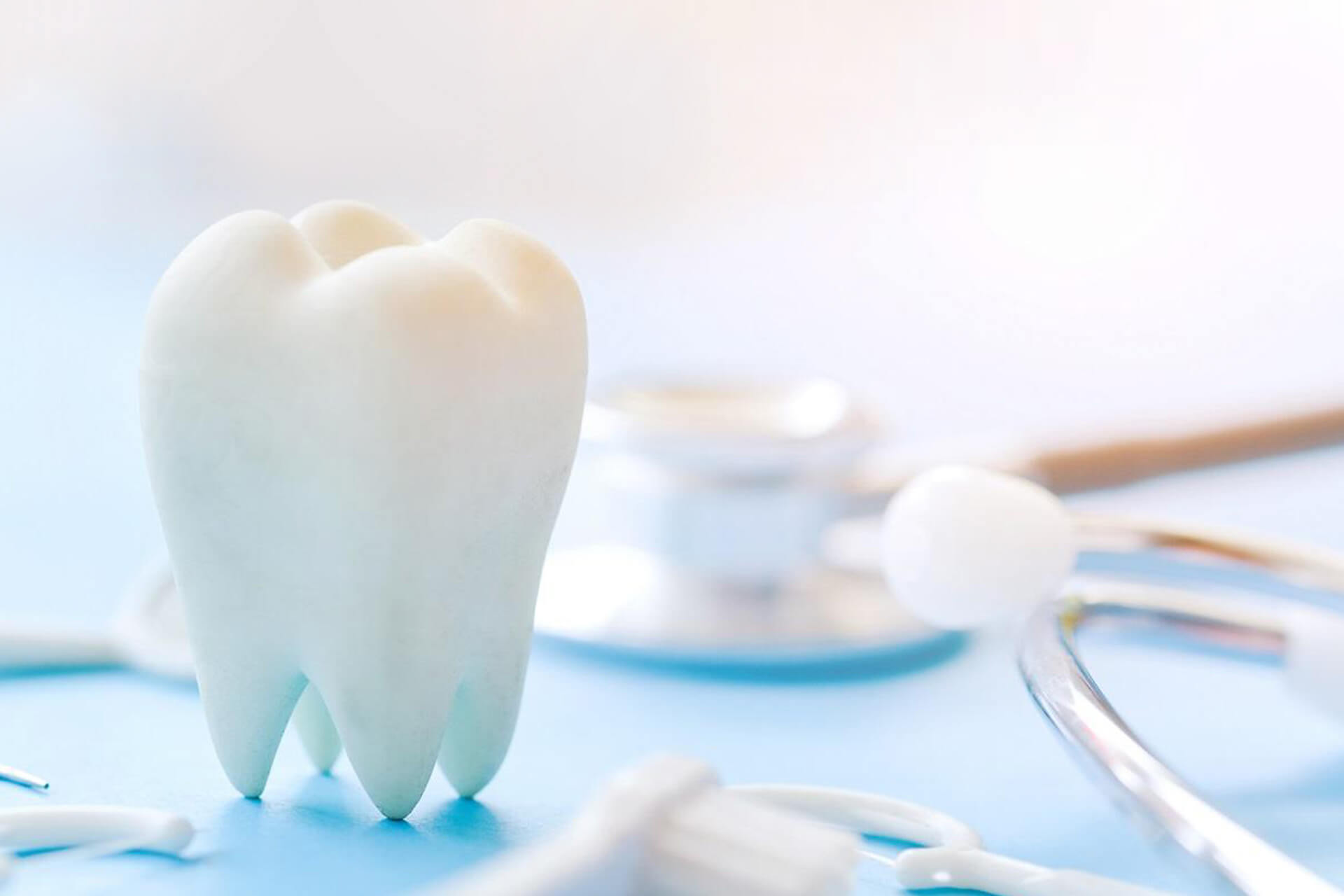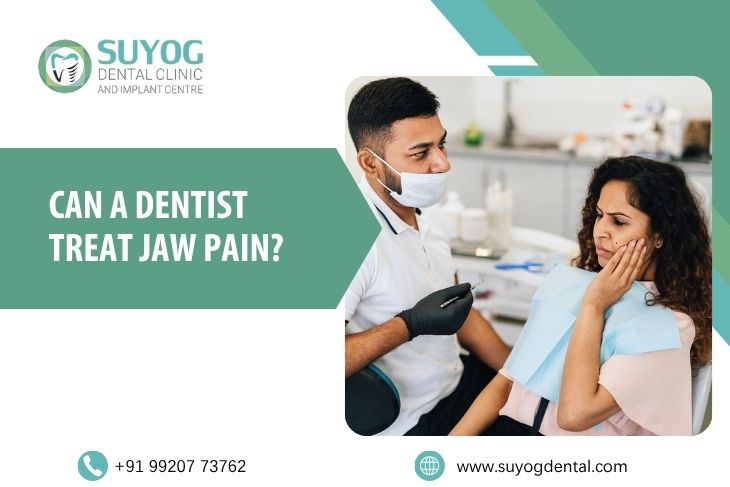
Can a Dentist Treat Jaw Pain?
If you've ever had a dull, aching pain in your jaw that seems to linger no matter what, you're not alone. Many of us have had that experience, almost like the jaw is protesting after too much talking, chewing, or maybe a bit of stress.

Now, before you dismiss it as just another nagging inconvenience, here's something important to keep in mind: your jaw pain might not just be a random occurrence. It could be a sign that something needs attention, and the right professional could help you find relief.
Let's explore the connection between jaw pain and dental health and discover why consulting a skilled dentist in Shivaji Park at Suyog Dental Clinic can significantly impact your treatment.
What Causes Jaw Pain?
Jaw pain isn't just about feeling discomfort while chewing or speaking. It can stem from a variety of dental and medical issues, and sometimes, it might be the result of a combination of factors. Here are a few common causes:
1. Temporomandibular Joint Disorder (TMJ)
One of the most common culprits behind jaw pain is a condition called Temporomandibular Joint Disorder (TMJ). The temporomandibular joint connects your jawbone to your skull, allowing it to move smoothly during talking, chewing, and yawning.
When the joint is misaligned or damaged, it can lead to sharp pain, especially when opening the mouth wide or moving the jaw from side to side. The pain can be sharp and often gets worse with activities like chewing or even speaking.
2. Teeth Grinding (Bruxism)
Another potential cause of jaw pain is bruxism, or teeth grinding. Many people grind their teeth unconsciously, especially during sleep. Over time, this puts immense pressure on the jaw muscles and the temporomandibular joint, causing pain.
This habit is often exacerbated by stress, which is something many of us deal with, particularly in today's fast-paced world.
3. Dental Infections
If you have an untreated tooth infection or abscess, the bacteria can spread to the jaw area, causing intense pain. Toothaches can also radiate to the jaw and can be particularly troublesome if left untreated. So, the next time you're experiencing persistent jaw pain, it might be more than just a minor annoyance—it could signal an underlying infection that needs attention.
4. Jaw Injury or Trauma
Any direct injury to the jaw, such as from an accident, sports activity, or even biting down too hard on something tough, can cause jaw pain. The jawbone can fracture, or the muscles can strain, leading to discomfort.
5. Sinus Infection
Did you know that a sinus infection can also cause jaw pain?The sinuses are located just behind your cheeks, and a sinus infection can cause referred pain in the jaw area. This might feel like an annoying, dull ache, which can confuse people into thinking it's a dental issue when it's related to your sinuses.
6. Arthritis
Conditions like osteoarthritis or rheumatoid arthritis can affect the joints in the jaw, causing pain and stiffness. These types of arthritis are more commonly found in older adults, but can occur at any age.
How Can a Dentist Help with Jaw Pain?
While it might seem like jaw pain is outside the scope of what a dentist can address, the truth is that your dentist is often the first line of defense when it comes to treating this issue.
As dental professionals, dentists are well-versed in the anatomy of the jaw and the surrounding muscles, making them uniquely qualified to diagnose and treat jaw pain caused by dental or muscular issues.
Here's how a dentist in Shivaji Park at Suyog Dental Clinic can help:
1. Diagnosing TMJ Disorders
A skilled dentist can assess your symptoms and determine if TMJ is the root cause of your jaw pain. Through a detailed evaluation that includes checking for jaw movement and clicking sounds, a dentist can make a diagnosis. They may also use diagnostic imaging, such as X-rays, to get a clearer picture of the joint's condition.
2. Custom Mouth Guards for Teeth-grinding
If your jaw pain is due to bruxism (teeth grinding), a dentist can create a custom mouth guard that you wear at night. This helps reduce the pressure on your jaw and teeth, alleviating the pain caused by grinding. It's a simple, non-invasive treatment option that can bring you significant relief.
3. Dental Treatment for Underlying Issues
If the jaw pain is caused by an untreated dental infection, abscess, or cavity, your dentist can treat it at the clinic. By addressing the disease or damage to the tooth, the dentist can relieve the associated pain in the jaw. For example, a root canal procedure might be necessary to treat an infected tooth.
4. Orthodontic Treatment
Sometimes, jaw pain can be related to the alignment of your teeth and bite. If you have a misaligned bite (malocclusion), it can put additional pressure on your jaw, leading to pain. A dentist or orthodontist can offer solutions like braces or clear aligners (invisible braces) to straighten your teeth and correct the bite, thereby alleviating pressure on your jaw.
5. Jaw Exercises
If your jaw pain is related to muscle tension or misalignment, your dentist may recommend specific jaw exercises to relieve pain. In some cases, dentists may help with muscle relaxation and joint mobilization, promoting healing and reducing pain.
6. Surgical Options for Severe Cases
While most cases of jaw pain can be treated with conservative methods, in some instances, surgery might be necessary, especially if there's a structural issue with the temporomandibular joint. In these cases, your dentist may refer you to a specialist, but they can help coordinate the process and ensure you're getting the care you need.
When Should You Visit a Dentist for Jaw Pain?
It's essential to see a dentist if you're experiencing persistent jaw pain that doesn't improve on its own. If you find that:
- Your jaw pain is sharp and persistent, particularly when chewing or talking.
- You hear a clicking or popping sound when moving your jaw.
- You are unable to open your mouth wide or feel stiffness in the jaw.
- You've recently had an injury or trauma to your face or jaw.
- Headaches, earaches, or neck pain accompany your jaw pain.
These could be signs that you need professional dental care. Delaying treatment can lead to more severe problems, so don't wait too long before consulting with an experienced dentist.
How to Prevent Jaw Pain
While some causes of jaw pain, like arthritis, can't always be prevented, there are several lifestyle changes and habits you can adopt to reduce the risk of jaw pain:
- Avoid clenching and grinding your teeth, especially during sleep. A custom mouthguard can help.
- Manage stress through relaxation techniques like yoga, meditation, or deep breathing to avoid teeth grinding.
- Practice good posture, especially if you work at a desk or use electronic devices for long periods.
- Avoid hard or chewy foods that might put additional strain on your jaw.
- Be mindful of jaw movement, particularly during activities like yawning or chewing tough foods.
If you're dealing with jaw pain, don't just ignore it.
Whether it's due to a TMJ disorder, teeth grinding, dental infection, or another underlying issue, at Suyog Dental Clinic, we have the experience and expertise to address your jaw pain and provide the right treatment plan to bring you relief.
Don't wait for the discomfort to worsen, schedule an appointment today with an expert dentist in Shivaji Park and take the first step toward a pain-free jaw.



